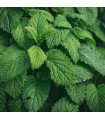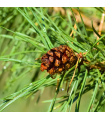Our oils are hand poured into biophotonic glass bottles because we want to extend their lifetime and preserve their energetic value. Biophotonic glass is reusable!
Botanical aspects: family Myrtaceae The Tea Tree is a small tree or shrub with needle-like leaves. It is also domestically referred to as Ti-Tree. It can grow up to 7 meters (20 feet) and thrives in marshy areas, though it is now cultivated in plantations. The aboriginal people of Australia have long used Tea tree Oil. Historically, the leaves were used as a substitute for tea, which is how it got its name. During World War II, the producers and the cutters of Tea Tree were exempt from military service until enough essential oil had been accumulated to accommodate the military's needs. Tea Tree is very robust and is ready for cutting only two years after its previous harvest. As Essential Oils have become more accepted by the public, the use of Tea Tree Oil has increased significantly. Tea Tree has a fresh, slightly medicinal scent with characteristic woody, camphoraceous, spicy notes. Traditionally, the crushed leaves of Melaleuca alternifolia were used by Australian Aborigines to treat skin infections. Nowadays, this oil is used as an antiseptic in skincare products, in the perfume industry, and soaps and mouthwashes.
Chemical aspects: Monoterpenes, Monoterpenols, Terpinen-4-ol: 35 - 48%,
γ-Terpinene: 14 - 28%
Country of Origin: Australia
Color of oil: A thin, clear, pale yellow liquid.
Method of extraction: Steam Distilled
Year:2020
Shelf life:4-5 years
Batch:lot #50034A181
Plant Parts: Leaves
Safety considerations: Dilute before use. May cause skin irritation in some individuals; a skin test is recommended before use. For people with allergic tendencies, systematically perform an allergy test before use. Never apply essential oils directly on mucous membranes, nose, eyes, and auditory canal. Contact with eyes should be avoided. For external use, only! Do not use essential oils in intravenous or intramuscular injections. The use of essential oils is not recommended with children, pregnant or lactating women, elderly persons, or persons who are suffering from chronic diseases. Never heat up an essential oil for diffusion.
Metaphysics: strength, resistance, and confidence.
Energetics: Tea Tree oil is neutral. Tea tree oil tonifies the Qi and strengthens the Shen. It clears heat, dispels toxins. Tea tree oil is cooling. It is ideal for patients with inflammation or low-grade fever. It is recommended for physically delicate individuals who struggle not only with their physical bodies but with the feeling of victimization.
Chakras: solar plexus
Element - Metal
Therapeutics: antibacterial(broad-spectrum), antibiotic, anti-inflammatory, antiseptic, antiviral, decongestant(venous and lymphatic), expectorant, neurotonic, immuno-stimulant.
Blends With: Cinnamon Bark, Clary Sage, Clove Bud, Geranium, Lavender, Lemon, Myrrh, Nutmeg, Rosewood, Rosemary, and Thyme.
References:
Tisserand & Young Essential Oil Safety, 2nd Edition Churchill Livingstone Elsevier. Edinburg 2014
Mojay, Gabriel, Aromatherapy for Healing the Spirit, Healing Arts Press, Rochester, VT 1997
Battaglia, S. The Complete Guide to Aromatherapy, vol.3., Psyche & Subtle, Queensland, Australia, 2012
Battaglia, S. The Complete Guide to Aromatherapy, vol.1. , Foundations & Materia Medica, Australia 2020
Jade Shutes, Foundations of Aromatherapy, Certification Program Course, New York Institute of Aromatic Studies



Leave a review